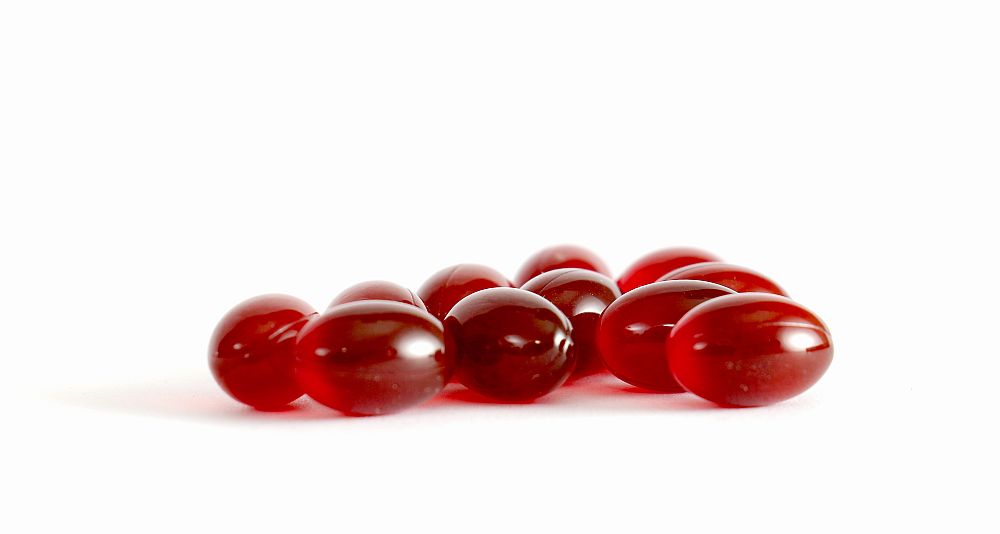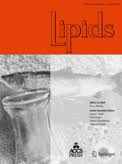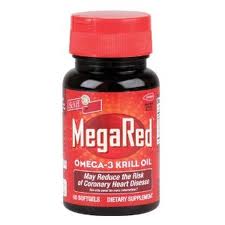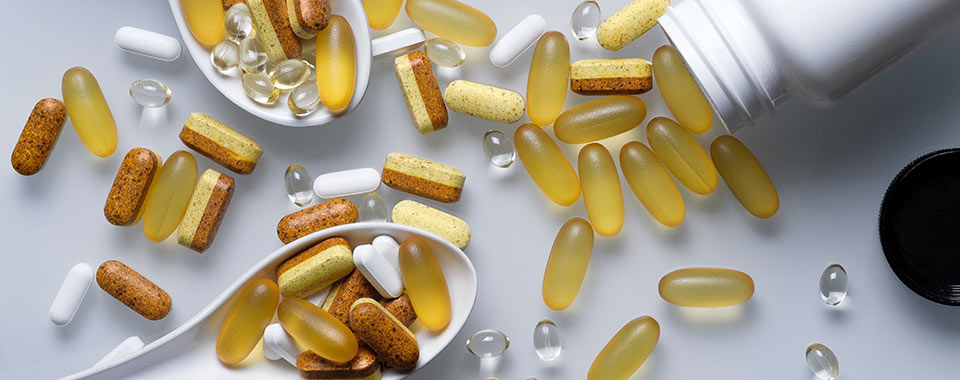In a previous blog, I discussed the cost and benefits of Krill oil vs Fish Oil.
The message was: Krill oil is definitely better than fish oil, but only a little bit.
An unpublished study presented by Neptune Krill Oil (NKO) in 2009 showed that Krill oil was about 30 to 40% better at getting Omega-3 incorporated into your body.
A New Clinical Study: Same Results
Now, a new study was just published by Aker BioMarine, the makers of Superba krill oil. The study titled Metabolic Effects of Krill Oil are Essentially Similar to Those of Fish Oil but at Lower Dose of EPA and DHA, in Healthy Volunteers was published in the Nov. 2010 issue of Lipids Journal.
In this paper, we once again, get confirmation that krill oil is better than fish oil. But again, only by a little bit.
Here is the result in a nutshell:
The health benefits of 1000 mg of fish oil Omega-3 can be had with about 650 mg of Krill oil Omega-3.
In other words, Krill oil is 1.5X better than Fish Oil.
Practical Example: MegaRed Krill Oil has 90 mg of Omega-3 from Superba Krill Oil. Based on this new research, you will need 7 to 8 MegaRed pills to equal 1000 mg of Omega-3 from fish oil.
At $0.49 per pill, that’s $3.92 per day (Walgreens price).
Patients in this study took the equivalent of 7 MegaRed pills a day, and yet, there was no reduction in triglycerides or cholesterol.
MegaRed packaging and marketing materials suggest a dosage of just one small pill per day.
Krill Oil vs Fish Oil: Study Conclusions
- There is no difference in how much Omega-3 is absorbed into your body
- No difference in markers of oxidative stress (F2-isoprostane)*
- No difference in C-reactive protein*
Krill Oil’s Little Surprise!
For the most part, this paper says that krill oil is better than fish oil.
But there was a nasty little surprise hidden in there!
Unlike fish oil, Krill oil increases the level of Arachidonic acid (AA) in your body.
Yikes!
AA is a nasty little Omega-6 that causes a lot of health problems if its levels are too high.
Dr. Barry Sears calls AA “possibly the most dangerous fat known.”
Your body needs tiny little amounts of AA, but get a little more than you need…and you have the perfect ingredient to create poor health.
If you’re perfectly healthy, a little bit of AA won’t hurt you, but if you have any inflammatory disease, even a little extra AA will make your life miserable.
Bottom-line – Krill oil vs Fish oil:
Based on this study (read the study here),
- Krill oil is still better than fish oil.
- Krill oil is 1.5X times better than fish oil.
- Krill oil may increase Arachidonic Acid
- There is no difference between Krill oil and Fish oil when it comes to other health markers.
But Krill oil is 10X more expensive than fish oil (on an Omega-3 basis.)
Why consumers continue to buy and pay 10X more for a product that provides only 1.5X more benefit will continue to astound me.
The authors of the study did not do this, but I suspect that if they had compared Krill oil vs Fish Oil in EHTYL ESTER form, Krill may have performed even better. Possibly 2X better? But still, in my opinion, 2X better does not justify a 10X premium in price.
|
So the last word on Krill oil is far from written.
* These statements have not been evaluated by the Food and Drug Administration. This product is not intended to diagnose, treat, cure, or prevent any disease.






I have used Krill oil and its much better than fish oil. The krill is a small shrimp-like marine crustacean. There are 85 types of krill present in the world’s ocean, the most abundant is the Antarctic Krill (Euphasia Superba). Krill oil Professional, this unique product is formulated using only Krill Oil that has earned Consumer Lab Quality Seal of Approval for purity, potency and freshness.
How does krill oil increase Arachidonic acid levels more than fish oil when krill contains astixanthin and fish doesn’t? Also, How is there no difference in triglycerides between fish oil and krill oil when fish is a triglyceride and krill is a phospholipid? Something doesn’t add up here…
Hi John – the study is not very clear about how and why it increases Arachidonic acid (AA). It’s puzzling to me too. But to put things in perspective, the amount of Arachidonic Acid increase is very minor. Eating serving of french fries cooked with corn oil probably increases AA a lot more. Having said that, Astaxanthin has NOTHING to do with AA. AA is a by-product of the eicosanoid pathway – it comes from Omega-6 metabolism. There is no connection with astaxanthin.
The fact that the molecular structure of fish oil is often in the triglyceride form (3 fatty acids connected to a glycerol backbone) has nothing to do with the clearance of triglycerides in the blood. They are two separate issues – molecular structure versus metabolic effect.
– Vin
I have found no evidence online that krill oil increases arachidonic acid. Can you supply a link? The only reason that might happen is the presence of a polyunsaturated oil in the capsule which used to be the case. There are no carrier oils in NKO at the present time. Otherwise, I’d suspect the study of being flawed. Thanks very much.
Hi Eric – here is the link: http://www.ncbi.nlm.nih.gov/pmc/articles/PMC3024511/ the paper is open-source and freely available.
To put things in perspective, I think the Arachidonic Acid (AA) increase is minor. You’d probably get a bigger AA spike after eating french fries or a donut cooked in Omega-6-rich soybean oil. But one of the reasons I take Omega-3 is to reduce the impact of AA on my health. You need EPA to do this. Krill oil is a poor source of EPA, so I high-EPA fish oils. Regardless, the following is a quote from the study:
“The level of arachidonic acid (C20:4n-6) increased from baseline in the krill group, whereas a decrease was observed in the fish oil group. The changes in arachidonic acid between the fish oil and the krill oil groups, and the control group differed significantly (p = 0.001). Pairwise comparisons showed that the mean increase in arachidonic acid in the krill oil group was significantly different from the mean decreases in the fish oil and control groups, but there was no significant difference between the mean changes in arachidonic acid level between the fish oil and control groups.”
I don’t think the study is flawed…but both the study and I may have overstated the magnitude of this new finding. And there is usually no need for carrier oil, polyunsaturated or otherwise, in krill or fish oils.
My issue with krill oil is not the AA production, but rather the low dosage people end up consuming due to the low payload in the small capsules and the deceptive marketing that encourages it.
Why is there so little DHA in MegaRed Krill Oil. How can it be as effective as fish oil? We are told the daily intake should be 600 mg of DHA.
Hi Veda – krill oil is naturally low in both EPA and DHA. It’s just the way the critter was built. Cold water fish are much better source of both EPA and DHA. Whoever told you that you must take 600 mg of DHA per day is wrong. The adult human brain can only absorb about 3 mg of DHA per day. If you include all the other organs, you’d use up about 50 mg of DHA. The 600 mg DHA per day thing is a popular myth that has no basis in science. Unless of course, you’re pregnant, in which case, 600 mg DHA isn’t enough. We have a few blogs about to be published that go into much more detail. Stay tuned.
-Krill’s plentiful EPA and DHA has been scientifically studied to significantly reduce plasma arachidonic acid (AA).-
(http://healthypets.mercola.com/sites/healthypets/krill-oil-for-pets.aspx)
So who’s right ?
Hi Ginger – krill is NOT plentiful in EPA or DHA. It contain both, but only in small quantities. What krill contains a lot of is phospholipids and its benefits are independent of both Omegas. Remember that krill is better absorbed (about 1.5 times) than fish oil but again, you’re talking about a small amount of EPA and DHA. You’re better off with high potency fish oil if you’re interested in Omega-3. The math does not make sense to me.
My wife and I (both 70) have been taking ArcticPure Krill Oil for several years (1 x 500 MG capsule per day). Your arguments are very convincing. What should we look for in a fish oil as a capsule???
Please advise!
Hi Jens – first, if you are in a position to afford it and tolerate it, see if increasing your dosage from 1 to 4 capsules a day makes a difference because I don’t think 1 capsule of krill oil is doing much for you.
If that does not work and you want to try a fish oil, here are the basic things to look for:
1. Purity – lack of pollutants and contaminants. The only way to know if your oil is pure is to see if the brand you want is listed on IFOS Consumer Reports.
2. Potency – how much Omega-3 is present in a capsule. Ideally, the more the better. After all, you’re taking it for the Omega-3. Again, see IFOS reports.
3. Pill size – if you like small pills like krill oil capsules, then this rules out a lot of potential candidates. Here is an option if you want small-but-concentrated fish oil pills: http://www.amazon.com/Pharma-Grade-InnovixLabs-Concentrated-Burp-Free-Capsules/dp/B00F5ZV6W6/
4. Burping issues – if you struggle with this, look for enteric coated pills.
Hope this helps.
Thanks Vin! It is nice to see folks willing to share their knowledge. Right now I am looking at something called Omega-Cure: it looks expensive but it also looks a heck of lot better than Krill Oil. It is expensive, but I wonder if it is still expensive when compared to taking the multiple daily capsules of Krill Oil. It also seems that – regardless of how many capsules of Krill I swallow, the Omega-Cure Fish Oil seems to be better on all fronts. Do you have an opinion on that, please!
Thanks! Jens
Hi Jens – OmegaCure is definitely a good product. If you like the taste of taking liquid fish oil, it is definitely worth a try. Yes, it is expensive, but if it works well for you, then it may be worth it.
Hi Vin!
$ 20 per week (if you take the recommended dose of 3 teaspoons per day) seems awfully high. They claim the fish oil has no taste, and one can order it with a taste of Vanilla. The earlier link you sent seems to be more affordable but of course it all comes down to how much of the “good stuff” is in each dose. Is there some sort of guidance regarding “how much of the good stuff” (and what is the good stuff) one should look for?
Vin, I appreciate your advice, I really do. Thanks!
Jens
Hi Jens – by ‘good stuff,’ I will assume you’re referring to Omega-3 EPA and DHA. How much Omega-3 depends on your specific health goals and how much Omega-6 you get from your normal diet. But for most people, 1000 mg to 2000 mg of Omega-3 per day will get the job done. The good thing about liquid Omegas is that it is very easy to get this much Omega-3 with just one teaspoon. With capsules, you may need more than one. More on that here: http://www.omegavia.com/fish-oil-dosage/ If you get ‘pharma-grade’ Omega-3, you will get more Omega-3 per pill.
Hello, I have been reading the comments trying to research Omega’s for proper products and doses for the needs of my son and I. On December 29,2012 you said this: source of both EPA and DHA. Whoever told you that you must take 600 mg of DHA per day is wrong. The adult human brain can only absorb about 3 mg of DHA per day. If you include all the other organs, you’d use up about 50 mg of DHA. The 600 mg DHA per day thing is a popular myth that has no basis in science. Unless of course, you’re pregnant, in which case, 600 mg DHA isn’t ” then here you are saying more is best 1,000-2,000mg. I’m getting so confused here lol
Hi Beth – the beauty and frustrating thing about science is that you have to change your stance as new evidence becomes available. The article that said your brain can only absorb 3 mg DHA per day is still right. But there is new evidence (from 2017) that says you need 600-1000 mg DHA per day for cognitive health benefits. This doesn’t make the ‘3 mg per day’ study false. It just means that cognition may require higher levels. There is nothing confusing about how much you need for pregnancy.
See this link for a graph that discusses DHA dosage ‘sweet spot.’ https://omegavia.com/new-omega-3-dha-600-supplement/
THANKS again! I read somewhere that 1.5 grams per day of DHA is recommended for joint issues. Is that what you have read? Finally (I hope) is there one good product (affordable) that contains both, or can one take these separately? My intention would be to find these two (DHA and Omega 3) in liquid form.
Again, our thanks!!!
Jens
Hi Jens – you’d be fine with 1.5 grams of total Omega-3 (both EPA and DHA) but 1.5 grams of DHA certainly won’t harm you, but it does not sound quite right to me. You may want to read these two articles – one on liquid Omega-3 and another on why EPA is better at joint health.
http://www.omegavia.com/liquid-fish-oil/
http://www.omegavia.com/why-omegavia-is-high-in-epa-omega-3-part-1/
I think you may be fine with liquid products made by Nordic Naturals or Carlsons.
Vin,
I cannot thank you enough! To think someone takes the time to answer lots of questions from someone entirely unknown – unusual in this day and age and an enormous credit to you. I will follow through on all your suggestions and at some point get back to you with a “report”. Outstanding and thoughtful advice – thanks again for being so “unusual”! Jens
I have IBS and it seems to be that I do not digest fat very well. (I likely have a deficiency of the pancreas as taking a pancreas supplement helps.) I tried taking Omega-3 fish oil and it made my IBS worse. I then tried krill oil and seemed to tolerate it much better than fish oil, but the krill oil has so little omega-3 that the lower fat might have been why I tolerated it better.
I have seen other people say that krill oil is digested easier than fish oil. Is there anything about krill oil that makes it easier to digest for people with IBS that do not digest fat well?
Krill oil is expensive and I believe that I am not getting enough DHA and EPA by taking the small dose of krill oil that I can almost afford. So I would like to get a more concentrated omega-3 supplement, but need one that is low in fat and easier for me to digest.
I looked at a few omega-3 supplements that are a blend of fish oil and krill oil (hoping to boost the DHA + EPA while keeping to easier to digest krill oil), but all the ones that I saw seem to be much higher in fat (the amount of fat that they have is significantly more than fat from the DHA + EPA).
I notice that OmegaVia is very highly concentrated (90% of the fat is beneficial DHA + EPA). Do you think that people who do not digest fat well would tolerate OmegaVita well? Is there any other omega-3 supplement that you think would be good for people like me?
Hi Darryl – krill oil pills are small and have very little fat in them. Most of the content of krill oil is phospholipids, which are relative easy to digest and absorb. This is why you’re having an easier time consuming krill oil. If this works for you, keep doing it and maybe increase your dosage gradually to see if you see any improvements in your health. Although I seriously doubt that krill oil or any pill for that matter will help cure IBS. You will need to embrace a diet and lifestyle change from the ground up, with a lot of discipline. Most people with IBS get there with inappropriate diet, inappropriate lifestyle and possibly excess antibiotic use in the past. Of course, genetic predisposition could play a part. I suggest you work with a dietitian who specializes in a Paleo or anti-inflammatory diet: http://authoritynutrition.com/11-paleo-low-carb-registered-dietitians-with-blogs/
If you decide to take a stronger Omega-3 supplement, you may want to try taking it with fat digesting lipase enzyme supplement like this: http://www.amazon.com/Integrative-Therapeutics-Lipase-Concentrate-HP-90-Veg/dp/B0030N8M5O/ …may be that’ll help.
I have a difficult time in swallowing pills, would like to take Omega 3 for my arthritis, Could you suggest the smallest capsule or pill, Krill or the omegavia, not the better pill but the smallest pill. Thank you , love the answer.
Hi Nilda – try the EPA 500 product. It is much smaller than regular OmegaVia. Here it is: http://www.omegavia.com/epa-500/ But frankly, if you hate swallowing fish oil pills, you need to cozy up to flavored liquid Omega-3 oils. With liquids, you can ingest large quantities of Omega-3 with just one teaspoon. It’s hard to do that with small pills. The tinier the pill, the more of them you’ll need to take to feel any effect.
thank you for your advice. will order the liquid form and give it a try. Nilda
Link to Todd Runestad’s “The 10 Commandments of Ingredient Sourcing” that was published in Functional Ingredients magazine does not work. I be very interested in reading it.
Hi Jan – linked fixed. Thanks for letting me know. Here it is: http://www.newhope.com/ingredients-general/10-commandments-ingredient-sourcing
How about wild sockeye Alaskan salmon 5times a week, instead of either fish oil
or krill oil? Love all your information
Hi Dian – if you are eating wild sockeye salmon five times a week, you don’t need to worry about taking fish or krill oil at all!